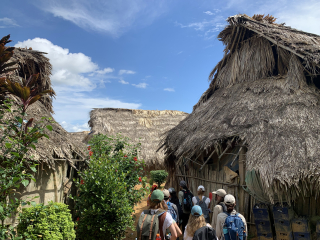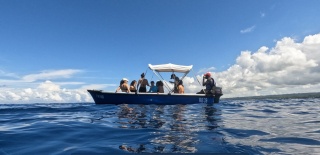Panama Field Study Semester

For complete and up to date information, please visit Panama Field Study Semester.
The Program
The McGill Panama Field Study Semester (MPFSS) is a joint venture between McGill University and the Smithsonian Tropical Research Institute (STRI). Students will be living for up to four months in Panama taking courses that specifically address Latin America social and tropical environmental issues.
Contact Information
Field Studies & Internship Office
Faculty of Science
ifso.science [at] mcgill.ca
Barbados Field Study Semester

For complete and up to date information, please visit McGill Barbados Field Study Semester.
The Program
Students registered in the McGill Barbados Field Study Semester (MBFSS), located at the Bellairs Research Institute, learn about the science of sustainability and how it integrates the three pillars of sustainability – environmental, social and economic – and apply this knowledge to a real-life question by conducting an applied, field-based, research project.
Contact Information
Field Studies & Internship Office
Faculty of Science
ifso.science [at] mcgill.ca
East Africa Field Study Semester

For complete and up to date information, please visit McGill East Africa Field Study Semester.
The Program
The McGill East Africa Field Study Semester (MEAFSS) Program intends to introduce students to East Africa, specifically to widen their understanding of the goals, circumstances, challenges, and opportunities of the people living in the areas visited. Through an increased understanding of Canada's link with the area, participants of the program should be better equipped to become active and effective contributors to sustainable development in Eastern Africa.
Contact Information
Field Studies & Internship Office
Faculty of Science
ifso.science [at] mcgill.ca
Exchange Programs
McGill has bilateral exchange agreements with over 100 universities around the world, plus the Quebec university system has additional agreements (called CREPUQ exchanges) with 250 more, mainly in France.
Exchange students pay McGill tuition fees and register as Non-Resident students while they are away and register as Visiting Students (no fees) at the host university. Credits completed satisfactorily at the host university count towards the McGill degree but not the McGill CGPA. Exchanges are for one semester or one academic year. Check out the Study Abroad Fair held annually in early October.
The best time to participate in an exchange program is during the year before you graduate (U2). You must have a CGPA of 3.0 or better to be considered. The deadline for applying for an exchange is early February before your expected Fall departure. You should start planning your exchange and researching possible exchange destinations during October of your U1 year. Watch for notices of the Student Exchange Information Sessions.
For Exchange Information, see Faculty of Science - Study Away and Exchanges and Faculty of Science - General Information.
For Exchange partners, see McGill Abroad.
For academic information about credit transfer consult Nancy Nelson, Biology Undergraduate Advisor at nancy.nelson [at] mcgill.ca.
Study Away
You may study for one semester or one academic year at a 3- or 4-year degree granting university of your choice. If there is no exchange agreement, you pay the prevailing tuition fees at the host university and you deal directly with the host university for making inquiries, applying for acceptance and paying fees. You must get Faculty approval. Visit Faculty of Science - Study Away and Exchanges.
McGill School of Environment
The McGill School of Environment offers several courses at the undergraduate and graduate levels. Many are open to all McGill students, while some are restricted to students in MSE programs.